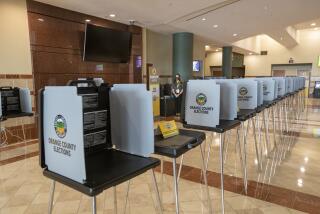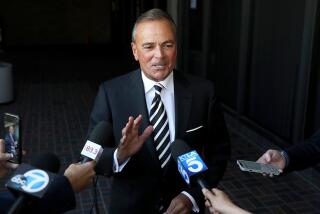Finance flip-flopping
A case can be made that public financing of presidential campaigns is an idea whose time has come and gone. But that wasn’t the opinion of either John McCain or Barack Obama when they indicated that they would make use of public financing -- McCain in the primaries, Obama in the general election -- as long as his opponent did too. Now both candidates are having unseemly second thoughts.
Public financing -- subsidized by a voluntary checkoff on tax returns -- was introduced in the post-Watergate 1974 amendments to the Federal Election Campaign Act, which also limited what candidates could spend on their campaigns. But in 1976, the Supreme Court struck down the expenditure limits except for candidates who chose to accept public funds. In the primaries, federal funds match private contributions; in the general election, candidates who accept funding must forgo contributions.
In the beginning, federal funding was an offer candidates found hard to refuse. But in recent years, several trends -- rising costs that have outstripped expenditure limits, the outlawing of “soft money” contributions to the parties and the advent of Internet fundraising -- have made it less attractive.
This year, neither Obama nor Hillary Rodham Clinton are accepting public funds for the primaries, and Clinton, if nominated, is expected to reject financing in the general election. McCain, in seeking a campaign loan and in representations to state election authorities, originally indicated he would rely on matching funds in the primary season. But an upsurge in donations has led him to try to withdraw from the system -- an action that, in the view of some lawyers, requires permission from the Federal Election Commission. But the FEC currently lacks enough members to grant such approval.
In a debate that only law students could enjoy, McCain’s critics suggest that the prospective Republican nominee is legally bound to accept public financing for the rest of the period before the party convention in September -- and also bound by spending limits. McCain’s defenders reply that he didn’t irrevocably commit himself to accepting matching funds and that his eligibility for public funds was not technically collateral for his campaign loan. Legalities aside, it is embarrassing that the senator -- the coauthor of the 2002 McCain-Feingold law increasing government oversight of election campaigns -- has soured on public financing after taking advantage of the expectation that he would participate in the system.
Obama too experienced what might be called a contribution conversion. Last year, when he was still an underdog to Clinton, a spokesman for his campaign reacted positively to a proposal by McCain that he would accept federal financing in the general election if the Democratic nominee did. But with his new front-runner status -- and facing the prospect of raising more private money than McCain in a general election -- Obama has begun to waver. Asked in the last Democratic debate if he was waffling on a promise to accept public financing, he dodged, saying that, if nominated, he wants to “sit down with John McCain and make sure that we have a system that is fair for both sides.” That sounds like the “old politics” that Obama inveighs against.
Both candidates should get over their buyer’s remorse. What they gain by abandoning public financing, they may lose in credibility.
More to Read
Sign up for Essential California
The most important California stories and recommendations in your inbox every morning.
You may occasionally receive promotional content from the Los Angeles Times.










